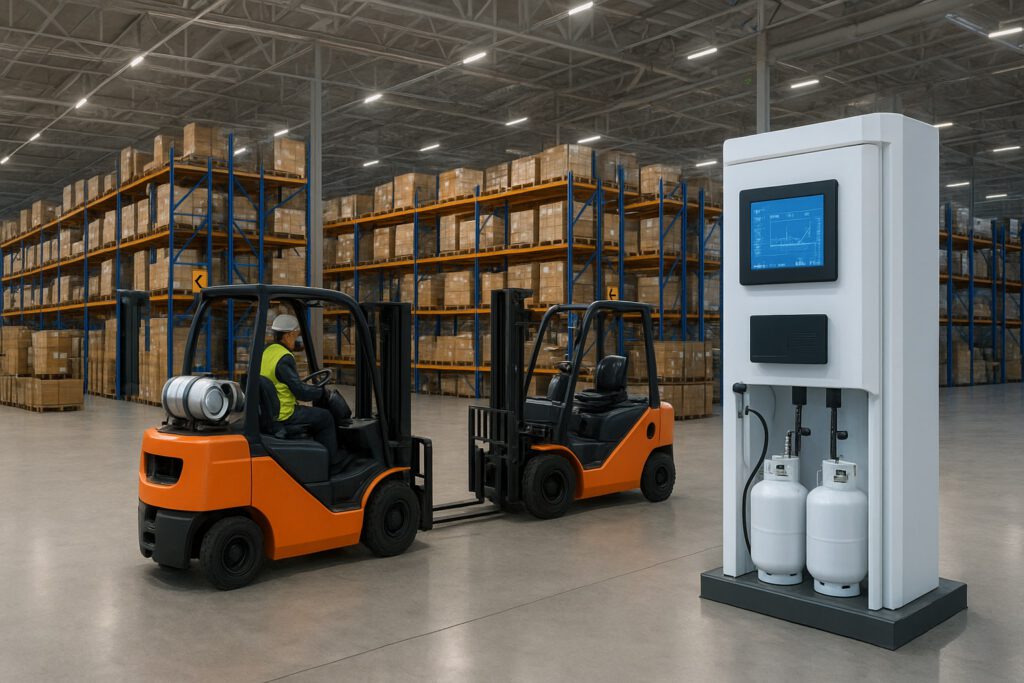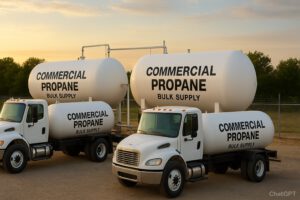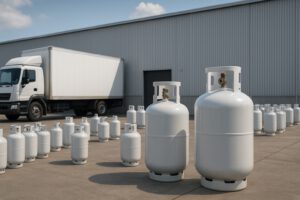
Modern warehouse operations demand reliable, efficient energy solutions that keep material handling equipment running smoothly while minimizing downtime and operational costs. Propane-powered forklifts combined with advanced tank monitoring systems provide the perfect combination of performance and fuel management for industrial facilities.
Understanding propane forklift operations, cylinder exchange programs, and automated tank monitoring systems helps warehouse managers optimize fuel efficiency, reduce operational costs, and ensure uninterrupted material handling capabilities.
Propane-Powered Forklifts and Material Handling
Propane forklifts offer superior performance for warehouse operations, providing the power and reliability needed for demanding material handling applications.
Forklift Types and Applications
Different propane forklift designs serve various warehouse functions, from narrow aisle operations to heavy-duty loading applications.
Counterbalance Forklifts
Traditional propane counterbalance forklifts remain the workhorse of most warehouses, offering versatility for general material handling.
- Electric to propane conversions: Upgrade existing electric fleets to propane power
- Dual-fuel options: Systems that can switch between electric and propane
- Heavy-duty models: 8,000-15,000 lb capacity for demanding applications
- Three-wheel designs: Improved maneuverability in tight spaces
Narrow Aisle Forklifts
Specialized propane forklifts designed for high-density storage operations maximize warehouse space utilization.
- Reach trucks: Extendable masts for accessing high shelves
- Turret trucks: 180-degree rotating masts for efficient picking
- Order pickers: Personnel platforms with picking capabilities
- Stacker trucks: Compact designs for tight aisle operations
Rough Terrain Forklifts
Outdoor propane forklifts handle loading docks, shipping areas, and external material movement.
- All-terrain tires: Pneumatic tires for uneven surfaces
- High ground clearance: Navigate docks and ramps easily
- Weather-resistant designs: Operate in various outdoor conditions
- Heavy-load capacity: Handle shipping containers and bulk materials
Propane Fuel Systems for Forklifts
Modern propane fuel systems maximize forklift uptime while ensuring safety and efficiency in warehouse environments.
Cylinder Exchange Programs
Cylinder exchange programs provide seamless fuel management with minimal downtime for propane forklift operations.
How Exchange Programs Work
- On-site exchange stations: Dedicated areas for quick cylinder swaps
- Pre-filled cylinders: Always ready for immediate use
- Inventory management: Supplier handles cylinder tracking and rotation
- 24/7 availability: Emergency fuel access when needed
Exchange Program Benefits
- Zero downtime: Instant fuel replacement in under 30 seconds
- No fuel storage: Supplier manages all cylinder inventory
- Cost predictability: Fixed exchange fees per cylinder
- Environmental benefits: Reduced waste from reusable cylinders
Propane Fuel Efficiency
Propane provides superior energy density and efficiency compared to other forklift fuels, optimizing warehouse productivity.
Performance Advantages
- Higher energy content: More power per gallon than diesel or gasoline
- Cleaner combustion: Reduced emissions and carbon buildup
- Consistent power delivery: Steady performance throughout the shift
- Cold weather reliability: Operates in freezing temperatures
Cost Analysis
- Fuel efficiency: Lower cost per hour of operation
- Maintenance savings: Reduced engine wear and component replacement
- Extended run times: Fewer refueling stops per shift
- Energy rebates: Potential utility incentives for propane use
Automated Tank Monitoring Systems
Modern tank monitoring systems provide real-time visibility into propane levels, enabling proactive fuel management and automated replenishment.
Monitoring System Components
Comprehensive tank monitoring solutions combine hardware, software, and connectivity for complete fuel oversight.
Sensor Technology
- Ultrasonic sensors: Non-contact level measurement
- Pressure sensors: Monitor tank pressure and fuel quality
- Temperature sensors: Track ambient and fuel temperatures
- Leak detection sensors: Immediate alert for fuel loss
Communication Systems
- Cellular connectivity: Real-time data transmission
- GPS tracking: Location monitoring for mobile tanks
- Wireless networks: Integration with warehouse Wi-Fi systems
- IoT platforms: Cloud-based data management
Automated Delivery Scheduling
Smart monitoring systems automatically trigger deliveries based on usage patterns and inventory levels.
Delivery Triggers
- Level-based alerts: Automatic ordering when fuel drops below thresholds
- Usage pattern analysis: Predictive ordering based on consumption trends
- Weather-adjusted scheduling: Seasonal demand forecasting
- Emergency delivery protocols: Priority routing for critical situations
Delivery Optimization
- Route optimization: GPS-based delivery routing for efficiency
- Time window scheduling: Deliveries during optimal warehouse hours
- Inventory synchronization: Real-time stock level coordination
- Multi-site management: Centralized monitoring for multiple locations
Usage Tracking and Analytics
Advanced monitoring systems provide detailed analytics to optimize propane consumption and operational efficiency.
Data Collection and Analysis
Comprehensive data tracking enables data-driven decisions for fuel management and equipment optimization.
Usage Metrics
- Fuel consumption rates: Per equipment, shift, and department
- Efficiency trends: Performance over time and conditions
- Peak usage periods: High-demand time identification
- Equipment utilization: Fleet usage patterns and optimization
Performance Analytics
- Cost per unit handled: Fuel cost analysis by operation type
- Maintenance correlations: Fuel efficiency and equipment health
- Environmental impact: Emissions tracking and reduction
- ROI calculations: Financial benefits of monitoring systems
Safety and Compliance Features
Tank monitoring systems enhance safety through proactive alerts and compliance tracking for warehouse operations.
Safety Monitoring
Advanced systems provide multiple layers of safety protection for propane operations.
Leak Detection and Prevention
- Real-time leak monitoring: Immediate alerts for fuel loss
- Pressure anomaly detection: Abnormal pressure change alerts
- Temperature monitoring: Overheat and freeze protection
- Emergency shut-off integration: Automatic safety responses
Compliance Tracking
- Regulatory reporting: Automated compliance documentation
- Inspection scheduling: Proactive maintenance reminders
- Certificate management: Digital record keeping for permits
- Audit trails: Complete operational history tracking
Installation and Integration
Successful tank monitoring implementation requires careful planning and professional installation for optimal performance.
System Installation
Professional installation ensures reliable operation and seamless integration with existing warehouse systems.
Hardware Deployment
- Sensor placement: Strategic positioning for accurate readings
- Cable routing: Protected wiring for durability
- Power systems: Reliable backup power for continuous operation
- Weather protection: Outdoor-rated equipment for all conditions
Software Integration
- Existing systems compatibility: Integration with warehouse management software
- API connections: Data sharing with other business systems
- User interface design: Intuitive dashboards for operations teams
- Mobile access: Remote monitoring capabilities
Cost Benefits and ROI
Tank monitoring systems deliver significant cost savings through optimized fuel management and operational efficiency.
Financial Benefits
Comprehensive monitoring systems provide measurable financial returns through multiple cost-saving mechanisms.
Fuel Cost Optimization
- Reduced fuel waste: Early leak detection prevents losses
- Optimized ordering: Just-in-time delivery reduces carrying costs
- Usage optimization: Data-driven efficiency improvements
- Bulk purchase savings: Volume discount leveraging
Operational Savings
- Emergency delivery reduction: Predictive ordering minimizes rush fees
- Downtime prevention: Proactive maintenance reduces equipment failure
- Labor efficiency: Automated processes reduce manual monitoring
- Insurance savings: Improved safety records lower premiums
Future of Warehouse Propane Management
Emerging technologies continue to enhance propane management systems for warehouse operations.
Innovation Trends
Advanced technologies are transforming how warehouses manage propane fuel and equipment operations.
AI and Machine Learning
- Predictive maintenance: AI-driven equipment health monitoring
- Usage forecasting: Machine learning consumption predictions
- Anomaly detection: Automated identification of irregularities
- Optimization algorithms: Dynamic fuel management strategies
Smart Technology Integration
- IoT connectivity: Comprehensive equipment networking
- Blockchain tracking: Secure fuel transaction verification
- Augmented reality: AR-assisted maintenance and troubleshooting
- Voice control: Hands-free system management
Implementation Best Practices
Successful propane monitoring system implementation requires careful planning and execution.
Planning Phase
Thorough assessment and planning ensures successful system deployment and adoption.
Assessment Steps
- Current operations review: Analyze existing fuel management processes
- Requirements definition: Identify specific monitoring needs
- Vendor evaluation: Compare system capabilities and costs
- ROI projections: Calculate expected financial benefits
Implementation Strategy
- Phased rollout: Gradual system implementation and testing
- Staff training: Comprehensive user education and support
- Change management: Smooth transition to new processes
- Performance monitoring: Track system effectiveness and benefits
Making the Decision
Choosing the right propane management solution involves evaluating current operations and future needs.
Evaluation Factors
Several key considerations help determine the best propane management approach for warehouse operations.
- Fleet size and complexity: Number of forklifts and equipment types
- Operations scale: Warehouse size and daily throughput
- Budget constraints: Investment level for monitoring systems
- Technology infrastructure: Existing IT and connectivity capabilities
Next Steps
Begin optimizing warehouse propane operations with professional assessment and planning.
- Conduct operations audit: Evaluate current fuel management processes
- Consult propane specialists: Get expert recommendations for your facility
- Request system demonstrations: Test monitoring solutions in your environment
- Develop implementation plan: Create timeline and budget for system deployment
Propane-powered warehouse operations with advanced tank monitoring represent the future of efficient, cost-effective material handling. Modern systems deliver the reliability, safety, and cost savings that today’s warehouses demand for competitive operations.
About Jennifer Whitaker
Propane industry expert and content contributor for MyPropane.com.
View all posts by Jennifer Whitaker →Related Articles

Commercial Propane Contracts and Bulk Supply: Business Guide
Sep 17, 2025 • 9 min read
Learn about commercial propane contracts with volume pricing, automatic delivery scheduling, and dedicated account management for large-scale operations and bulk…

Commercial Propane Cylinders: Business Applications Guide
Sep 18, 2025 • 9 min read
Discover commercial propane cylinders for business applications. Learn about cylinder types, DOT regulations, safety features, and proper handling for commercial…